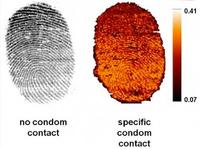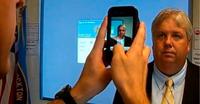-
Expanding Yuma flight testing schedule for Argus UAV
The World Surveillance Group (WSGI) revealed its plans of extending the flight testing schedule for its strange-looking Argus One UAV at the Yuma facilities at the U.S Army grounds in Arizona
-
-
New fingermarks detection technology

The new technology uses Matrix Assisted Laser Desorption Ionization Mass Spectrometry Imaging (MALDI-MSI) to provide crime scene investigators with key extra details about suspects; these details, such as any substances they might have touched, can provide crucial background information in a criminal investigation
-
-
Portable biometric system for police officers

Police now have a new low-cost, portable biometric tool in their arsenal to quickly and accurately identify a suspect: an Apple iPhone; using MORIS (Mobile Offender Recognition and Information System), an app developed by BI2 Technologies, police officers can now use an Apple iPhone to scan a suspect’s fingerprint or snap a photo of their face to scan their iris
-
-
Taser death leads to $10 million payout
The manufacturer of police Tasers recently awarded $10 million to a North Carolina family after a teenager was killed when he was shocked with a stun gun; Darryl Turner, a seventeen year old boy, died in a supermarket after a police officer shot him in the chest with a Taser Model X26 electronic control device in 2008
-
-
Sector Report for Tuesday, 26 July 2011: Law Enforcement Technology
This report contains the following stories.
Plus 1 additional story.
-
-
Gwinnet County, Georgia to issue instant e-tickets
In the past, in Gwinnet County, Georgia, like in many counties across the United States, residents would not see a traffic ticket on their records until several weeks later, but now thanks to new technology, police officers, fire marshals, and animal control agents will be able to issue and print citations immediately
-
-
Law enforcement and privacy concerns in Vancouver
Last month, the police in the otherwise sedate Vancouver had to use tear gas, pepper spray, and flash bombs in downtown Vancouver to try to disperse angry rioters who set cars on fire, looted stores, and taunted police officers after the Canucks’ 4-0 Stanley Cup final loss to the Boston Bruins; the police wants to use facial recognition technology to identify the rioters, but privacy advocates are worried
-
-
Law enforcement and privacy concerns in Massachusetts
Massachusetts has a plan: create a database which could map drivers’ whereabouts with police cruiser-mounted scanners that capture thousands of license plates per hour — and store that information indefinitely so local police, state police, federal agencies, and prosecutors could access it as they choose; privacy advocates are worried
-
-
Taser, Metal Storm collaborate on less lethal ammunition

TASER International has entered into a Memorandum of Understanding (MoU) with Metal Storm Limited and to develop and market TASER less-lethal ammunition for the Metal Storm MAUL weapon; Metal Storm’s MAUL weighs 800 grams can be fitted as an accessory to an assault rifle, or operated from its own shoulder stock or pistol grip attachments
-
-
FBI now free to search your trash?
FBI agents will soon have heightened investigative powers that would allow them to delve more deeply into databases, rummage through an individuals’ trash, or place surveillance teams on suspects; in the upcoming release of the Domestic Investigations and Operations Guide, the FBI’s manual, agents will be given greater leeway in searching for evidence of criminal or terrorist activity
-
-
New risk to first responders: chemical suicide
First responders and HAZMAT teams are becoming aware of a new threat: chemical suicide. This new type of suicide is increasing in popularity as a result of instructions being posted on the Internet; the suicide is carried out by mixing household cleaners and detergents to produce a cloud of toxic gas; trouble is, after killing its intended victim, the cloud of gas remains present, threatening to kill those who attempt a rescue
-
-
After FBI arrests LulzSec announces more cyber mayhem
In response to the FBI’s arrest of several hackers, the recently disbanded hacking group known as LulzSec has vowed to return and the group says it will renew its attacks on corporations and government agencies; the announcement comes after U.S. authorities arrested sixteen people last week in relation to the groups’ previous attacks which included bringing down PayPal’s website after it suspended its service to WikiLeaks
-
-
Students develop landmine detection robot
A team of Texas A&M University at Qatar students and faculty has developed a state—of-the-art landmine detection robot as part of the NI Mine Detection Robot Design Contest; The competition challenged engineering students in the Middle East to work toward solutions to the real-life landmine problem that the Arab region and other areas face in the aftermath of conflict
-
-
Test for classifying force used in bottle stabbings developed
Stabbing is the most common method of committing murder in the United Kingdom; in approximately 10 percent of all assaults resulting in treatment in the U.K. emergency units, glasses and bottles are used as weapons; official UK estimates suggest that a form of glass is used as a weapon in between 3,400 and 5,400 offenses per year; engineers at the University of Leicester have for the first time created a way of measuring how much force is used during a stabbing using a broken bottle
-
-
Lawmakers blast the Federal Protective Service
Last week lawmakers held a hearing to investigate the Federal Protective Service’s (FPS) progress in addressing its ongoing problems; the agency has made little progress drawing the ire of lawmakers; in recent years, FPS has suffered from a series of high-profile security failures
-
More headlines
The long view
Why Ukraine’s AI Drones Aren’t a Breakthrough Yet
Machine vision, a form of AI, allows drones to identify and strike targets autonomously. The drones can’t be jammed, and they don’t need continuous monitoring by operators. Despite early hopes, the technology has not yet become a game-changing feature of Ukraine’s battlefield drones. But its time will come.
